Driving in France: The common scams thieves try on foreign motorists
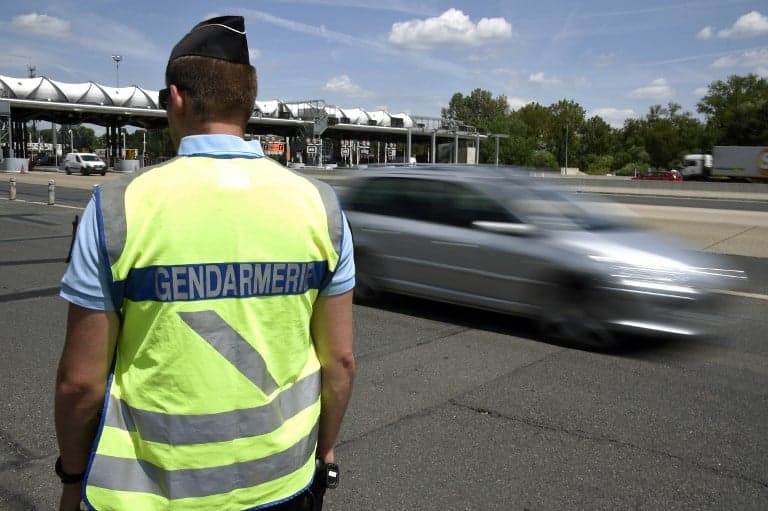
UPDATED article: Driving in France is for the most part a trouble free and even enjoyable experience, but in recent days readers have made The Local aware of a few suspected thieves trying out some old scams on drivers. So here's a look at the ploys to be aware of.
Tens of thousands of foreign holidaymakers travel on France's roads each summer and the vast majority enjoy a smooth trip.
For the most part the roads are safe, apart from the odd speeding driver, but there are a few dangers motorists need to be aware of. This list of commonly reported scams shows just how quickly highway robbers in France can separate you from your cash and belongings.
The "Irish Swindle"
There have been incidents in the south west and the south east of France of an English-speaking man and his family approaching people at service stations claiming to have been robbed and lost everything including credit cards and passports.
The man who is often with his wife and young children pleads for cash to help them get back to the UK. He promises to return the cash to the bank account when they've made it back home and will normally exchange phone numbers and messages for a few days until everything goes quiet. He is also happy for people to take his photograph and one of his car.
The scam has been dubbed the "Irish Swindle" in south west France after an Irish couple were arrested after allegedly conning drivers this way.
A French couple also contacted newspapers to warn others after they were the victim of this particular highway scam near Bordeaux.
You might just have to keep your charitable nature in check to avoid getting ripped off by this scam. Always be wary when approached at service stations by people claiming to have been robbed.
Romanian cash exchange
Recently a reader of The Local has made us aware of people he believes were trying to fool motorists into stopping with the intention of then robbing them.
Terry Miles was driving near Chalus, south west of Limoges in the Haute-Vienne department.
"We were driving along and approaching a lay-by outside Chalus when I noticed a young man standing by two black Audis trying to wave down the traffic, apparently in some distress," he said.
"Thinking there may have been an accident or a sudden illness, I stopped and opened my window. The young man, with a good head of black hair, a leather jacket and a prominent and rather heavy gold cross on a chain tried to explain in a form of French we didn’t understand that he had a problem.
"Then he tried broken English and opened a wallet to explain that they had no petrol as he only had a Romanian credit card which didn’t work and a small wad of large denomination Romanian banknotes.
"I told him there was a bank in Chalus but his English then deteriorated as he tried to get us to agree to change his Romanian notes for our Euros so we could take them to a bank. By this time his friend was approaching from behind him... We smelt two very large rats and drove away quickly."
"I won’t be stopping for anyone again unless it has a blue light and siren!"
They incident may of course have been entirely innocent, but there have been similar scams by thieves in the past in France.
Side view mirror scam
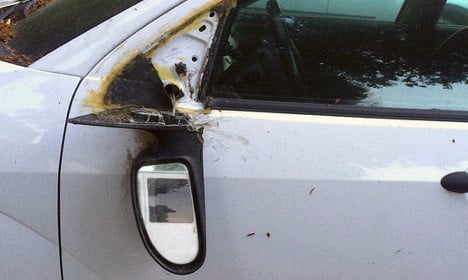 Photo: Lynn Friedman/Flickr
Photo: Lynn Friedman/Flickr
The newest trick out there targeting motorists has proven to be quite effective. The gist of it is that the scammer convinces a driver, often targeting the elderly, that they’ve damaged a side view mirror of the scammer’s car. The scammer then persuades the driver to pay damages right there on the spot instead of going through an insurance company.
To convince the victim, often these scammers will ask what their insurance company is and then pretend to have the same one.
They’ll call up an “insurance agent” that’s actually an accomplice who tells the victim that if they insist on going through insurance claims, they’ll have to pay thousands of dollars out of pocket.
They’ll instruct the driver to pay up front instead, promising they’ll soon be reimbursed. The scammer will then accompany the driver to a cash machine to collect their spoils.
Four members of a criminal gang were arrested for this fraudulent behaviour in April and July of 2016 in Angers, western France, reported Ouest France newspaper. Prosecutors said they were able to swindle at least €90,000 in total, picking up between €100 and €3,000 from each successful scam.
Cops turned robbers
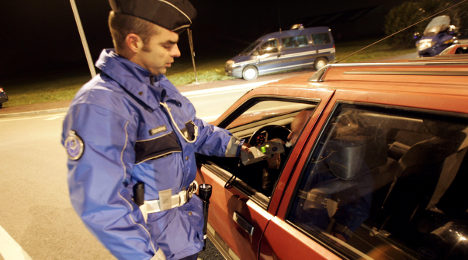
France's military police issued warnings last summer after a particularly determined organized crime gang disguised themselves as police to rob motorists. Usually at night, the gang targeted foreigners who are less aware of how French police work. They had a flashing blue light, maybe a red police armband, and official-looking clothing to look convincing, and signalled for vehicles to pull onto the hard shoulder before carrying out searches of the vehicle, bags and passengers under a pretext of looking for drugs or fake ID papers.
Of course, what they were really looking for was anything of value, which they would pocket during the 'search', banking on the fact that drivers would be too startled to notice what was going on.
“Sometimes it can take less than a minute and often they purposefully rob mobile phones and the keys of the car, so the victims cannot raise the alarm,” Alain Archaimbault, captain of the Gendarmerie told France Info radio.
To avoid falling victim to a scam, read up about your rights before driving in France; both the AA and UK Foreign Office have detailed information about local laws. Be aware that police would rarely carry out operations in plain clothes or unmarked police cars, and would never ask to search through bags under the pretext of looking for drugs. A real search would not take place by the side of a motorway for safety reasons, and real police will be happy for you to check their ID.
The faux breakdown
Always be wary of someone trying to flag you down for any reason, even if it seems that they need your help. A spokesman for British motorists association the AA said: "The British nature is generally to be helpful to people flagging them down," - and thieves know this. When you get out of the car to help them, an accomplice will slip into your own car, grabbing whatever they can."
To avoid falling victim to this sort of trick, if you do get out of your car to look at something, make sure you have locked it and have your keys with you - and don't get into the habit of leaving valuables lying around in plain sight in your car. "Not everyone is a prospective thief, but you should take basic precautions all the time," says the AA.
The below video from the UK Foreign Office shows real CCTV footage of this scam in action, proving how quickly it can be done.
The "lost" wallet
Yet another ploy that preys on kind souls. Scammers will flag down drivers, pretending their car has broken down, similar to the above situation. But instead sneakily stealing valuables right from your car, these scammers will ask for money to fix their vehicles. They'll play on sympathies by lamenting a stolen or lost wallet or a damaged bank card, and they'll often be accompanied by women and children.
Police say to keep in mind that most people whose cars have actually broken down will more likely ask for a ride to a petrol station instead of asking for money.
The virtual vehicle
If you're in France long-term, you may well be thinking of investing in a new car. Because cars are one of the biggest purchases made, they are a favourite with scammers - and you should be extra vigilant in a country where you aren't totally familiar with how things are usually done.
Scammers may advertise cars for sale, but once you show an interest in buying it, they'll request a transfer via Western Union or a similar service before they are able to send you the car. Be warned that in these cases it's very rare that the car ever turns up, or that it even existed in the first place. Try to buy through a trusted car dealer, but if must use a classified website, make sure to meet the seller in person and get all the relevant information before you even think about transferring the funds.
NEW: Crash and rob
The Local reported in July how a gang of masked men in a car were purposefully crashing into drivers on and around the A9 motorway in the south of France near the city of Nimes.
It turns out the men targeted their victims on their potential loot, so perhaps try to avoid displaying any expensive items like I-pads.
However if you are a victim there's almost certainly little you can do, so the safest thing to do would be to hand over what they demand and then call the police.
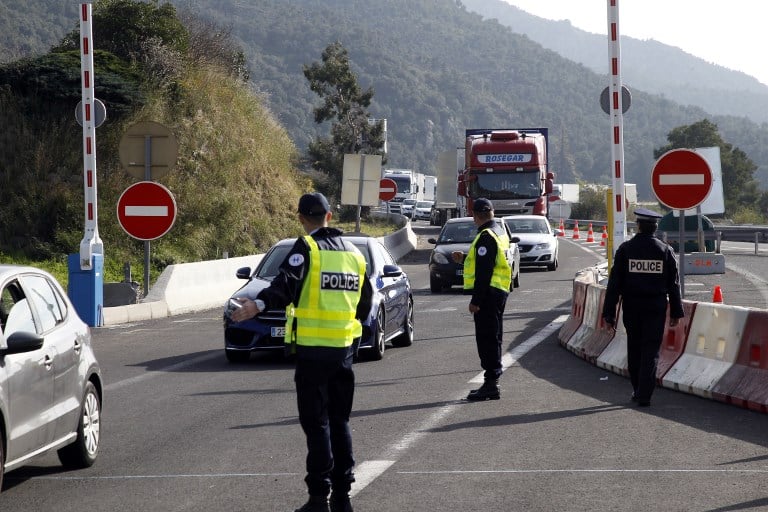
The sleeping driver
Many people think their belongings are safe as long as they are in the car with them, but thieves can be more audacious than you'd suspect. Drivers of lorries, caravans, mobile homes and other vehicles have reported being robbed while sleeping in their vehicle, according to the UK's Foreign Office.
Victims have claimed gas was pumped into their vehicle to send the occupants to sleep.
As well as perhaps installing a security alarm, be wary about parking in unsupervised camping grounds, car parks or motorway rest areas, and try to find a well-lit, well-populated area when you park.
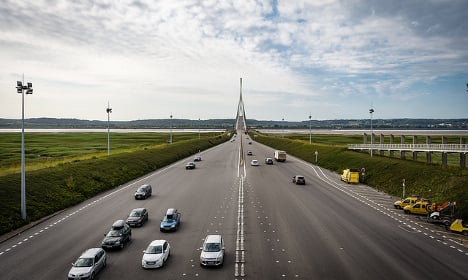
The car park distraction
Tourists in particular should be vigilant when loading or unloading a car, for example in a hotel car park. Watch out for anyone who tries to distract you while you're unpacking things from the boot; thieves may be disguised as parking wardens or hotel staff, but while they are speaking to you - probably in rapid French to add to your confusion - an accomplice may be grabbing whatever suitcase and other belongings are in the boot or on the ground next to the car. Just make sure you keep your eyes on your belongings at all times.
[#ContreLesVols] #Arnaque aux pneus crevés
Attention, nouvelle technique de vol par ruse!https://t.co/x1Eif4J0t6 pic.twitter.com/hT0nCCiDyp
— Police Nationale (@PNationale) March 3, 2016
Flat tyres
French police recently issued a warning about this particular scam, which is apparently becoming increasingly popular in France. "Thieves target the vehicles of elderly or vulnerable people, slash their tyres and await their return" a police source told BFM TV.
The fraudsters are then on hand to act as ‘good Samaritans’ and offer to help them fix the problem. Police have reported that they then find a pretext to take the elderly person to a cash machine, to pay for a missing piece of equipment, or compensate them for their good deed, and then make a swift getaway along with cash, a wallet, or even the card, having memorized the PIN code. They may also have helped themselves to any bags or valuables left within easy reach inside the car.
The AA say that petrol stations were a common location for this crime, and added that there had even been reports of tyres being slashed while cars were waiting in a traffic jam. Remember you can always turn down help from strangers if you are at all suspicious, and contact your emergency breakdown service instead.
Car crime hotspots
The AA told us that although much car crime is opportunistic and could happen anywhere, tourists and expats should be particularly vigilant when driving through areas noted for this kind of tricks. The motorway leading from France to Spain, the French-Belgian border and the Cote d'Azur are hotspots for the kinds of tricks listed above.
Finally, remember that the above list is not exhaustive. The AA say that although these tricks are commonly used in France and other countries, "thieves can be quite clever so they might always be thinking up something new". Be wary of anything out of the ordinary, try to avoid leaving valuables in the car, and if you have to get out even for a short period of time, lock the car and keep hold of your keys.
This article has ben updated since an original version was published in 2016
Comments (2)
See Also
Tens of thousands of foreign holidaymakers travel on France's roads each summer and the vast majority enjoy a smooth trip.
For the most part the roads are safe, apart from the odd speeding driver, but there are a few dangers motorists need to be aware of. This list of commonly reported scams shows just how quickly highway robbers in France can separate you from your cash and belongings.
The "Irish Swindle"
There have been incidents in the south west and the south east of France of an English-speaking man and his family approaching people at service stations claiming to have been robbed and lost everything including credit cards and passports.
The man who is often with his wife and young children pleads for cash to help them get back to the UK. He promises to return the cash to the bank account when they've made it back home and will normally exchange phone numbers and messages for a few days until everything goes quiet. He is also happy for people to take his photograph and one of his car.
The scam has been dubbed the "Irish Swindle" in south west France after an Irish couple were arrested after allegedly conning drivers this way.
A French couple also contacted newspapers to warn others after they were the victim of this particular highway scam near Bordeaux.
You might just have to keep your charitable nature in check to avoid getting ripped off by this scam. Always be wary when approached at service stations by people claiming to have been robbed.
Romanian cash exchange
Recently a reader of The Local has made us aware of people he believes were trying to fool motorists into stopping with the intention of then robbing them.
Terry Miles was driving near Chalus, south west of Limoges in the Haute-Vienne department.
"We were driving along and approaching a lay-by outside Chalus when I noticed a young man standing by two black Audis trying to wave down the traffic, apparently in some distress," he said.
"Thinking there may have been an accident or a sudden illness, I stopped and opened my window. The young man, with a good head of black hair, a leather jacket and a prominent and rather heavy gold cross on a chain tried to explain in a form of French we didn’t understand that he had a problem.
"Then he tried broken English and opened a wallet to explain that they had no petrol as he only had a Romanian credit card which didn’t work and a small wad of large denomination Romanian banknotes.
"I told him there was a bank in Chalus but his English then deteriorated as he tried to get us to agree to change his Romanian notes for our Euros so we could take them to a bank. By this time his friend was approaching from behind him... We smelt two very large rats and drove away quickly."
"I won’t be stopping for anyone again unless it has a blue light and siren!"
They incident may of course have been entirely innocent, but there have been similar scams by thieves in the past in France.
Side view mirror scam
 Photo: Lynn Friedman/Flickr
Photo: Lynn Friedman/Flickr

France's military police issued warnings last summer after a particularly determined organized crime gang disguised themselves as police to rob motorists. Usually at night, the gang targeted foreigners who are less aware of how French police work. They had a flashing blue light, maybe a red police armband, and official-looking clothing to look convincing, and signalled for vehicles to pull onto the hard shoulder before carrying out searches of the vehicle, bags and passengers under a pretext of looking for drugs or fake ID papers.
Of course, what they were really looking for was anything of value, which they would pocket during the 'search', banking on the fact that drivers would be too startled to notice what was going on.
“Sometimes it can take less than a minute and often they purposefully rob mobile phones and the keys of the car, so the victims cannot raise the alarm,” Alain Archaimbault, captain of the Gendarmerie told France Info radio.
To avoid falling victim to a scam, read up about your rights before driving in France; both the AA and UK Foreign Office have detailed information about local laws. Be aware that police would rarely carry out operations in plain clothes or unmarked police cars, and would never ask to search through bags under the pretext of looking for drugs. A real search would not take place by the side of a motorway for safety reasons, and real police will be happy for you to check their ID.
The faux breakdown
Always be wary of someone trying to flag you down for any reason, even if it seems that they need your help. A spokesman for British motorists association the AA said: "The British nature is generally to be helpful to people flagging them down," - and thieves know this. When you get out of the car to help them, an accomplice will slip into your own car, grabbing whatever they can."
To avoid falling victim to this sort of trick, if you do get out of your car to look at something, make sure you have locked it and have your keys with you - and don't get into the habit of leaving valuables lying around in plain sight in your car. "Not everyone is a prospective thief, but you should take basic precautions all the time," says the AA.
The below video from the UK Foreign Office shows real CCTV footage of this scam in action, proving how quickly it can be done.
The "lost" wallet
Yet another ploy that preys on kind souls. Scammers will flag down drivers, pretending their car has broken down, similar to the above situation. But instead sneakily stealing valuables right from your car, these scammers will ask for money to fix their vehicles. They'll play on sympathies by lamenting a stolen or lost wallet or a damaged bank card, and they'll often be accompanied by women and children.
Police say to keep in mind that most people whose cars have actually broken down will more likely ask for a ride to a petrol station instead of asking for money.
The virtual vehicle
If you're in France long-term, you may well be thinking of investing in a new car. Because cars are one of the biggest purchases made, they are a favourite with scammers - and you should be extra vigilant in a country where you aren't totally familiar with how things are usually done.
Scammers may advertise cars for sale, but once you show an interest in buying it, they'll request a transfer via Western Union or a similar service before they are able to send you the car. Be warned that in these cases it's very rare that the car ever turns up, or that it even existed in the first place. Try to buy through a trusted car dealer, but if must use a classified website, make sure to meet the seller in person and get all the relevant information before you even think about transferring the funds.
NEW: Crash and rob
The Local reported in July how a gang of masked men in a car were purposefully crashing into drivers on and around the A9 motorway in the south of France near the city of Nimes.
It turns out the men targeted their victims on their potential loot, so perhaps try to avoid displaying any expensive items like I-pads.
However if you are a victim there's almost certainly little you can do, so the safest thing to do would be to hand over what they demand and then call the police.

The sleeping driver
Many people think their belongings are safe as long as they are in the car with them, but thieves can be more audacious than you'd suspect. Drivers of lorries, caravans, mobile homes and other vehicles have reported being robbed while sleeping in their vehicle, according to the UK's Foreign Office.
Victims have claimed gas was pumped into their vehicle to send the occupants to sleep.
As well as perhaps installing a security alarm, be wary about parking in unsupervised camping grounds, car parks or motorway rest areas, and try to find a well-lit, well-populated area when you park.

The car park distraction
Tourists in particular should be vigilant when loading or unloading a car, for example in a hotel car park. Watch out for anyone who tries to distract you while you're unpacking things from the boot; thieves may be disguised as parking wardens or hotel staff, but while they are speaking to you - probably in rapid French to add to your confusion - an accomplice may be grabbing whatever suitcase and other belongings are in the boot or on the ground next to the car. Just make sure you keep your eyes on your belongings at all times.
[#ContreLesVols] #Arnaque aux pneus crevés
— Police Nationale (@PNationale) March 3, 2016
Attention, nouvelle technique de vol par ruse!https://t.co/x1Eif4J0t6 pic.twitter.com/hT0nCCiDyp
Flat tyres
French police recently issued a warning about this particular scam, which is apparently becoming increasingly popular in France. "Thieves target the vehicles of elderly or vulnerable people, slash their tyres and await their return" a police source told BFM TV.
The fraudsters are then on hand to act as ‘good Samaritans’ and offer to help them fix the problem. Police have reported that they then find a pretext to take the elderly person to a cash machine, to pay for a missing piece of equipment, or compensate them for their good deed, and then make a swift getaway along with cash, a wallet, or even the card, having memorized the PIN code. They may also have helped themselves to any bags or valuables left within easy reach inside the car.
The AA say that petrol stations were a common location for this crime, and added that there had even been reports of tyres being slashed while cars were waiting in a traffic jam. Remember you can always turn down help from strangers if you are at all suspicious, and contact your emergency breakdown service instead.
Car crime hotspots
The AA told us that although much car crime is opportunistic and could happen anywhere, tourists and expats should be particularly vigilant when driving through areas noted for this kind of tricks. The motorway leading from France to Spain, the French-Belgian border and the Cote d'Azur are hotspots for the kinds of tricks listed above.
Finally, remember that the above list is not exhaustive. The AA say that although these tricks are commonly used in France and other countries, "thieves can be quite clever so they might always be thinking up something new". Be wary of anything out of the ordinary, try to avoid leaving valuables in the car, and if you have to get out even for a short period of time, lock the car and keep hold of your keys.
This article has ben updated since an original version was published in 2016
Join the conversation in our comments section below. Share your own views and experience and if you have a question or suggestion for our journalists then email us at [email protected].
Please keep comments civil, constructive and on topic – and make sure to read our terms of use before getting involved.
Please log in here to leave a comment.